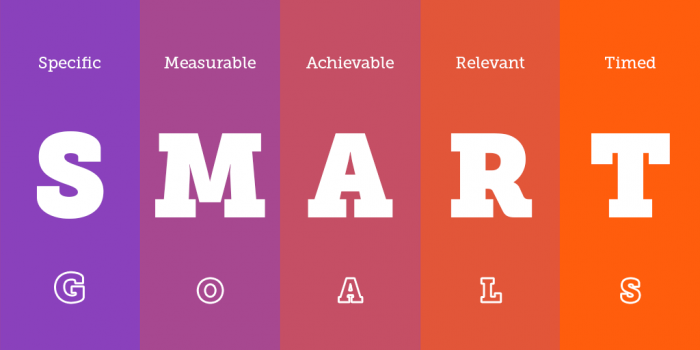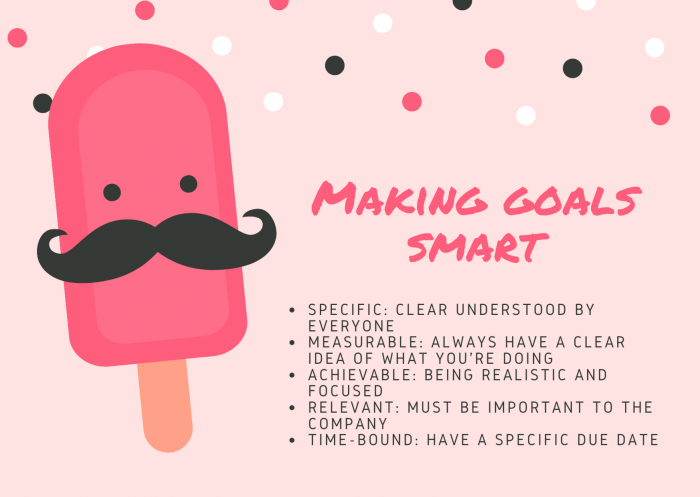This resource is provided by Team Compass – world leading SMART goals software since 2011.
SMART goals are a popular methodology to set company and team goals. Many CEOs and team leaders love this system. They view it as a way to make sure goals are clear and specific. In this article you will get an overview of how to write SMART goals. You can also check if your goals are SMART goals.
In addition, we’ll take a look at how you can go even further and get the most out of your SMART goals with the Objectives and Key Results methodology as implemented in Team Compass goal-setting software.
After all, while every person and company has a vision or a business plan, a successful company also has specific goals that help them reach their potential and not stray from the path to success.

Set Your Goals
However, not all goals are SMART. And a company will lose from that. That is why, we made an interactive application to test SMART. You can find out if your goals are really SMART or just some random ideas of where you want to go.
How to Write SMART Goals

Before we dive into how to write SMART goals, you must first take a look at what SMART goals actually are.
- Specific – they are clearly understood by everyone in the team;
- Measurable – you can always get a clear idea of how well you’re doing;
- Achievable – when planning, there’s no point in deciding to fulfill all dreams in a year. Make sure you think what you really could do;
- Relevant – the goals you set must be important for your company. The goal shouldn’t be “Let’s hire 20 people” but “Let’s increase the revenue enough in order to hire 20 people.”;
- Time-bound – they have a specific due date for completion to resist the urge to say “okay, we’ll do it next year.”
When you spend time to define your goals in all those categories, you are a lot more likely to achieve those goals and if not, you can analyze what went wrong and make adjustments for the future. Although the acronym is linear, you can’t always answer the questions in this order. And the way to approach this problem depends on your company.
In general, you can’t say if something is achievable without factoring all other aspects. To understand if your goal is relevant, it must already be specific. But you first have to set a timeline to say what you can measure in this time.
You can implement SMART goals in any part of an organization. If you’re not sure if it’s worth the time to plan it out for your company, try using free online goal setting software. Team Compass, for example, is free for up to 3 people with a 2-week trial for larger teams.
Bringing SMART Goals to Work Culture
Culture is the hottest topic for a workplace today. Good culture is essential to attract top talent and keep your employees from leaving. It increases engagement and with that, productivity. But how to be sure your employees value SMART, well thought-out goals and use it to better themselves and the company.
It’s important to remember that SMART isn’t just a buzzword. It’s a methodology – a way of doing things. And company culture is, in essence, a way things are done in a company. So, when you implement SMART to your culture, you should do it the same way as any other aspect: through communication and example.
Communication
Communicating SMART as a core value is important. Encourage your team to think more about what they can realistically achieve and reward them for well-set goals. If you give an impression that goal setting should be done quickly, then you can be sure that the goals they set are shallow at best. When the time comes to assess achievements make sure to credit those who have managed to set SMART goals and fulfill them.
Example
If you’re not SMART yourself, don’t expect your team to be. No one needs convincing that leaders should be good role models and Karima Mariama-Arthur says that the first thing to do is set an “impeccable standard of excellence.“
SMART goals set a standard of good planning. It shows that you know where you want to be and you have a good plan to get there. It gives confidence to your employees to know, that their leader has a plan.
No Excuses
SMART goals take away the excuses like “we’ll do it next year”. Or “it never was achievable anyway.” When the time is up, you must face reality. The good news is, that if you fail you get a clear overview of what you must do better next time.
Because, let’s be honest, it’s easy to set vague unrealistic goals like “Let’s make a lot of money in the future.” But these are more like dreams than goals. And they definitely are not good for you, your team, or your company. You can never say that you have achieved them, there is no way to measure your success.
An App to Check Your Goals
In Team Compass, we have developed a simple app that helps you determine if your goals are smart enough for success. Write down your goal and check how SMART it is.
Take the Weekdone’s SMART goal test here.
SMART Is Only the First Step
Using free online goal setting software like Team Compass to set SMART goals is only the beginning. While it is a good way to start thinking about your goals, to achieve true success, one must dig deeper.
Mindtools writes: “Various interpretations of SMART have meant that it can lose its effectiveness or be misunderstood. Some people believe that SMART doesn’t work well for long-term goals because it lacks flexibility, while others suggest that it might stifle creativity.”
OKRs – Update to The SMART Model
That is why you should take a look at the OKR goal setting framework. OKRs (Objectives and Key Results) is a way of setting quarterly team and company goals. With OKRs you set inspirational goals (Objectives). And to each Objective you assign a measurable Key Result that shows the specific metrics you need to accomplish to achieve your goal.
Updating Your Goals Weekly
There is a big problem with setting goals in many companies. That is, you forget a goal, after you set it. And it doesn’t matter how SMART and well-thought out your goal is. Unless you actively keep it in front of you all the time.
You set OKRs quarterly. However, they should always be in front of you. You must always ask yourself: “How will what I am doing right now help me accomplish my goals?”. After all, goals without deadlines are dreams. And business can’t be built only on dreams.
With OKRs you need to update your progress towards your Key Results weekly to make sure you and your team are on the right track.
OKRs need to be transparent and public across your entire company. That helps to ensure everybody knows what you are working on and what is everyone’s part in moving the company forward. That helps to build team spirit and alignment across your teams.
The idea behind SMART is already been built into the OKRs. It is in your Key Results that need to be specific, achievable, and measurable. And as OKRs are set for a quarter, they are automatically time-bound. So, OKR is like a SMART goal but with a focus on getting practical things done.
If you think that you are ready to use SMART goals and put some thought into your goals, you can sign up to Team Compass and start measuring the impact of your goals. It implements annual, quarterly, weekly and due date goals. It provides you with a visual goal progress tracking and reporting software for teams and employees. It’s free for small teams. Try it out here.

